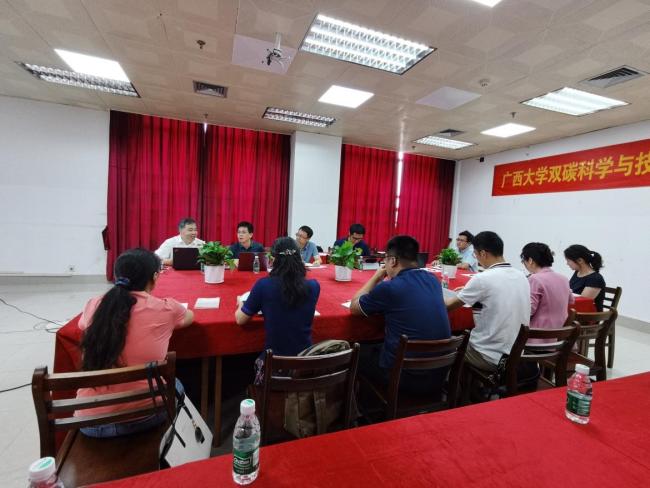On August 23rd, the Institute of Science and Technology for Carbon Peak and Neutrality of Guangxi University, convened its firs work seminar. The event saw the presence and leadership of Professor Xiao Jianzhuang, a standing member of the GXU Party Committee, Vice President, and Dean of the Institute. During the symposium, discussions centered on studying and deliberating upon the effective implementation of key provisions within the Carbon Peak Implementation Plan of Guangxi Zhuang Autonomous Region, as well as preparations for an upcoming international forum, the planning of a dual carbon-focused special section in the Guangxi University Journal, and strategies for converting research accomplishments into practical applications.
The seminar emphasized that each research team within the Institute should continuously engage in learning and comprehending the stipulations of the national dual carbon strategy and the Carbon Peak Implementation Plan of Guangxi Zhuang Autonomous Region. It was highlighted that a thorough understanding of the comprehensive requirements, primary objectives, critical tasks, collaborative cooperation, and policy safeguards outlined in the regional documents is of paramount importance. The research teams were encouraged to formulate meticulous plans and designs in alignment with urban and rural carbon peak endeavors, sustainable regenerated building materials, transportation systems, low-carbon economies, and policy considerations. This strategic approach entails a focus on pivotal highlights, the implementation of specific measures, harnessing the unique strengths and distinctive features of each research team, and fostering cross-disciplinary integration and collaborative innovation. By doing so, practical and efficient advancement in dual carbon research can be achieved, significantly bolstering the dual carbon undertakings of both Guangxi and the nation as a whole.

The conference underscored the significance of the inaugural International Forum on Green Building and Operation along the Pinglu Canal, positioned as a crucial sub-forum within Guangxi University’s China-ASEAN International Conference. This event stands as a tangible initiative to implement both national and regional strategic decisions concerning carbon peak and carbon neutrality. It serves as a dynamic platform for exploring technological innovation in the “dual carbon” realm, fostering the integration of academic wisdom from both domestic and international perspectives, and driving the conversion of scientific achievements into practical industrial applications. Entrusted with ensuring the organized and efficient preparation of the conference and the seamless execution of the international forum, the organizational committee meticulously aligns tasks with individuals in accordance with the comprehensive work plan. This will ensure efficient preparation of the conference and the seamless execution of the international forum.
Furthermore, the seminar delved into constructive discussions on intensifying collaboration with the Green Low-Carbon Technology Research Institute of the Guangxi Industrial Research Institute, with a particular emphasis on demonstrating and translating technological achievements into practical applications.
The Institute of Science and Technology for Carbon Peak and Neutrality of Guangxi University established in April 2023, strategically leverages the multidisciplinary strengths of the university by uniting nearly ten proficient research teams. The institute is devoted to addressing paramount foundational scientific inquiries and pivotal technologies in domains including low-carbon construction, energy systems, carbon sequestration in agriculture and forestry, as well as the formulation and adept management of dual carbon policies. By providing robust technical support, fostering talent, and offering informed decision-making guidance, the institute's research initiatives substantially contribute to the realization of both carbon peak and carbon neutrality objectives.
 Home
>
News & Events
>
News
Home
>
News & Events
>
News
 Home
>
News & Events
>
News
Home
>
News & Events
>
News




